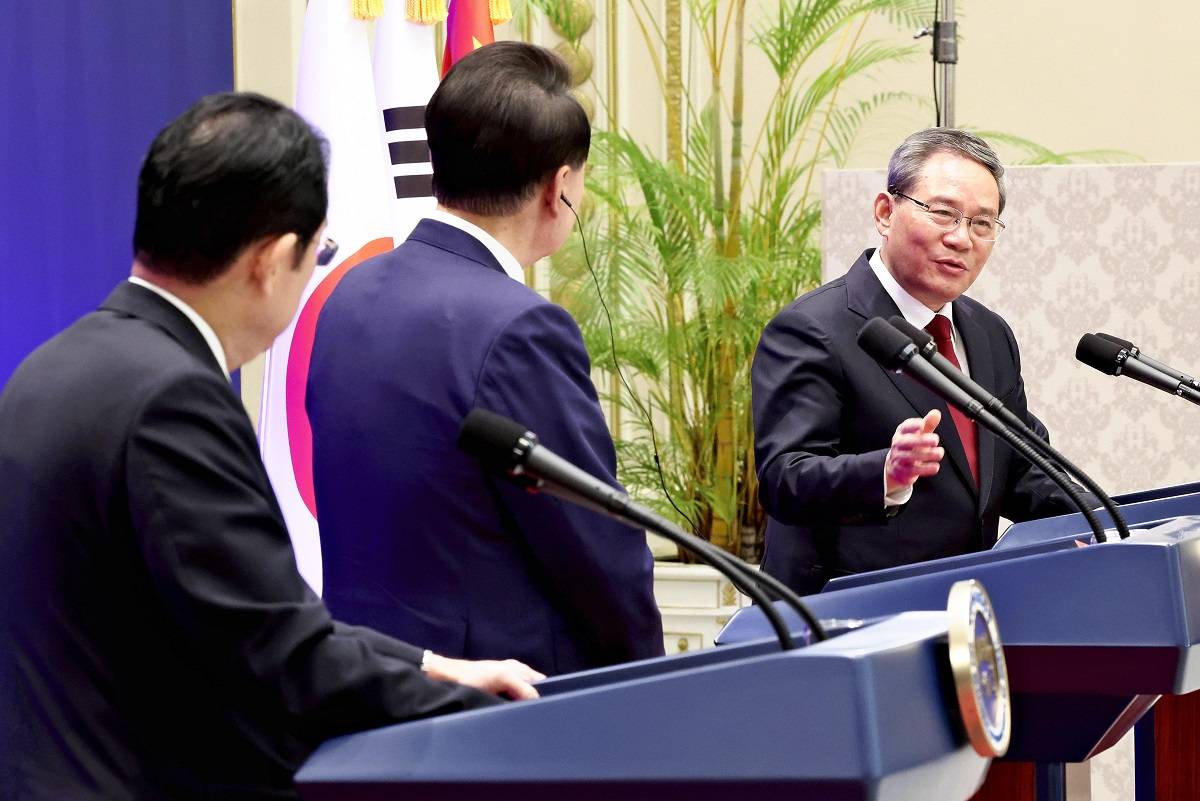Japan Blocks ‘Industrial Chain’ From Summit Declaration; China Likely Eyeing Domination of Global Markets

From right, Chinese Premier Li Qiang, South Korean President Yoon Suk Yeol and Prime Minister Fumio Kishida hold a joint press conference in Seoul on Monday.
20:00 JST, May 29, 2024
China demanded that the joint declaration for its recent trilateral summit with Japan and South Korea in Seoul include the term “industrial chain” as an area in which to strengthen cooperation, it has been learned. The Japanese side refused, however, according to diplomatic sources, believing that the expression reflects China’s attempt to dominate the global market in key industrial sectors.
China uses “industrial chain” to refer to the entire manufacturing process, the sources said, from raw materials to the manufacturing of finished products, by Chinese companies alone.
The administration of Xi Jinping has repeatedly indicated its intention to strengthen supply and industrial chains. It is seeking to bolster its industrial chains in key sectors such as electric vehicles and artificial intelligence.
During negotiations to finalize the joint declaration, Japan rejected the term “industrial chain” because it would allow Chinese companies to expand overseas and could lead to overproduction. On the other hand, Japan successfully sought the inclusion of the phrase “avoiding supply chain disruptions,” with China’s export restrictions on rare metals and other materials in mind.
Regarding “speeding up negotiations” over a trilateral free trade agreement among Japan, China and South Korea, the joint declaration included a statement that the nations will “continue discussions,” the expression that Japan pushed for.
China refused to make any concessions on the issue of North Korea, but it agreed with Japan’s assertions regarding economic security.
Top Articles in World
-

Israeli Ambassador to Japan Speaks about Japan’s Role in the Reconstruction of Gaza
-

Videos Plagiarized, Reposted with False Subtitles Claiming ‘Ryukyu Belongs to China’; Anti-China False Information Also Posted in Japan
-

Chinese Embassy in Japan Reiterates Call for Chinese People to Refrain from Traveling to Japan; Call Comes in Wake of ¥400 Mil. Robbery
-

Nepal Bus Crash Kills 19 People, Injures 25 Including One Japanese National
-

Russia: Visa Required for Visiting Graves in Northern Territories, Lifting of Sanctions Also Necessary
JN ACCESS RANKING
-

Producer Behind Pop Group XG Arrested for Cocaine Possession
-

Japan PM Takaichi’s Cabinet Resigns en Masse
-

Man Infected with Measles Reportedly Dined at Restaurant in Tokyo Station
-

Israeli Ambassador to Japan Speaks about Japan’s Role in the Reconstruction of Gaza
-

Videos Plagiarized, Reposted with False Subtitles Claiming ‘Ryukyu Belongs to China’; Anti-China False Information Also Posted in Japan
























